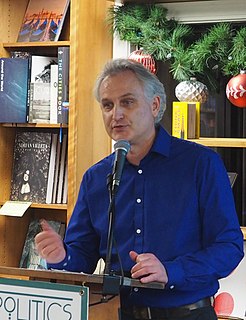A Quote by Deborah Tannen
It's our tendency to approach every problem as if it were a fight between two sides. We see it in headlines that are always using metaphors for war. It's a general atmosphere of animosity and contention that has taken over our public discourse.
Related Quotes
Have you ever noticed that the only metaphor we have in our public discourse for solving problems is to declare war on it? We have the war on crime, the war on
cancer, the war on drugs. But did you ever notice that we have no war on homelessness? You know why? Because there's no money in that problem. No money to be made off of the homeless. If you can find a solution to homelessness where the corporations and politicians can make a few million dollars each, you will see the streets of America begin to clear up pretty damn quick!
Civil disobedience is not our problem. Our problem is civil obedience. Our problem is that people all over the world have obeyed the dictates of leaders…and millions have been killed because of this obedience…Our problem is that people are obedient allover the world in the face of poverty and starvation and stupidity, and war, and cruelty. Our problem is that people are obedient while the jails are full of petty thieves… (and) the grand thieves are running the country. That’s our problem.
That is another theme in the book [Dreams from My Father]. How do we exercise more empathy in our public discourse? How do we get the black to see through the eyes of the white? Or the citizen to see through the eyes of the immigrant? Or the straight to see through the eyes of the gay? That has always been a struggle in our politics.
We should be increasing our investment in the infrastructure for public safety and public health. But when we talk about those as two distinct and separate departments or budgetary items, we're missing out on the ways in which we should be most effectively using our resources and serving our residents.
The darkness that we see in our world today is due to the disintegration of things out of harmony with God's laws. The basic conflict is not between nations, it is between two opposing beliefs. The first is that evil can be overcome by more evil, that the end justifies the means. This belief is very prevalent in our world today. It is the war way. It is the official position of every major nation.
Liberty is not about class war, income war, race war, national war, a war between the sexes, or any other conflict apart from the core conflict between individuals and those who would seek power and control over the human spirit. Liberty is the dream that we can all work together, in ways of our choosing and of our own human volition, to realize a better life.
Our problem was that in the American approach to Soviet affairs policy has oscillated between people who take an essentially psychological approach and people who take an essentially theological approach, and the two really meet. The psychologists try to "understand" the Soviet Union. And try to ease its alleged fears. The theologians say the Soviets are evil.
Clipper took a relatively simple problem, encryption between two phones, and turned it into a much more complex problem, encryption between two phones but that can be decrypted by the government under certain conditions and, by making the problem that complicated, that made it very easy for subtle flaws to slip by unnoticed. I think it demonstrated that this problem is not just a tough public policy problem, but it's also a tough technical problem.
I have seen something like it happen in battle. A man was coming at me, I at him, to kill. Then came a sudden great gust of wind that wrapped out cloaks over our swords and almost over our eyes, so that we could do nothing to one another but must fight the wind itself. And that ridiculous contention, so foreign to the business we were on, set us both laughing, face to face - friends for a moment - and then at once enemies again and forever.





































